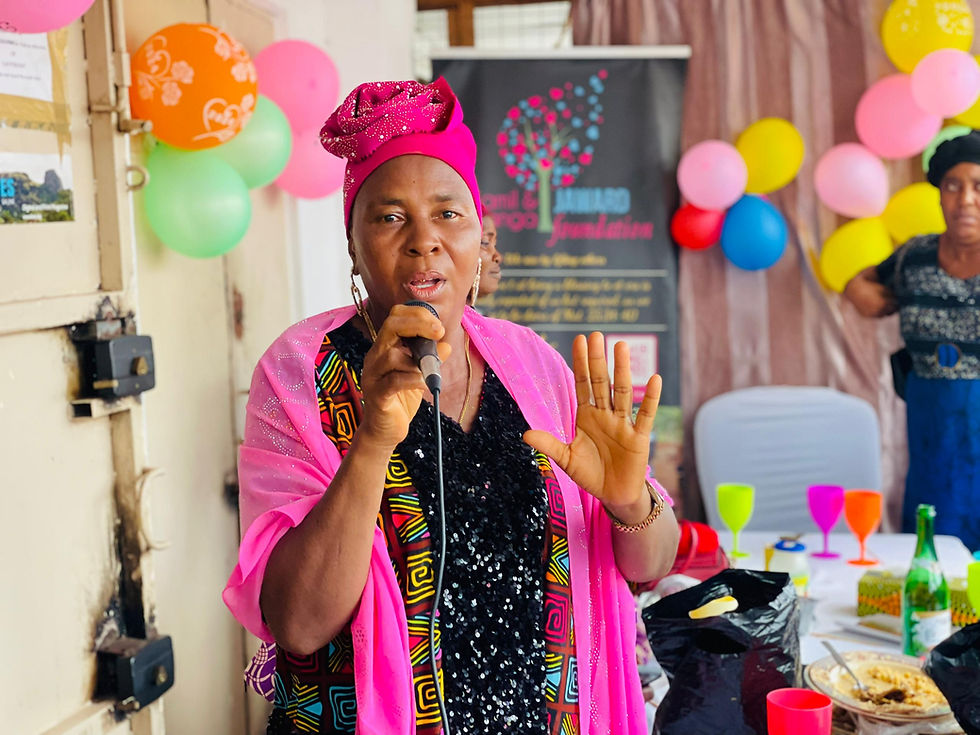Beyond Laws: A Tale of Stolen Childhood
- Nov 20, 2025
- 4 min read
BY: Augusta Osmatu Bangura
There was a boy, barely twelve, whose mornings began not with breakfast or toys but with the naked will to survive. When he was five, most of his peers were already in school, learning their letters and numbers, but he was not. His parents were alive, young, and seemingly able, yet for reasons he could never understand, they did not put him in school. Another woman, seeing his hunger to learn, took pity on him and enrolled him. But when he came to live with his father’s parents, he stopped going again, until his uncle, the father’s younger brother, noticed him, had pity, and sent him back to class. That too was short-lived, as his uncle died soon after, leaving him to struggle for himself.

When he finally returned to school in grade four, five, and six, he carried the burden of survival on his small shoulders. He provided his own lunch, did odd jobs for neighbors, and begged for money to pay for what was required at school. By twelve, he had already learned what many adults never do: what it meant to fend for yourself. Yet the heartbreak only deepened. When he sat for the NPSE exams, ready to enter JSS1, there was nowhere he could get the money needed for the interview. His grandmother could only stretch so far, telling him, “I have my own children to care for, it's not like your mom helps out.” His father had died a year earlier, and his mother’s promises to support him never materialized. So he went from person to person, relative to relative, asking for help and employment opportunities for his mother. Stop for a moment; let that sink in. A child, barely twelve, going from person to person, asking for work… not for toys, but for a job for his mother. Can you imagine?
Education, he had learned, was not a guarantee. It was a luxury, one that not every child in Sierra Leone could afford, even when it's deemed to be free. For him, and for countless others, it had to be fought for, clawed for, scraped together from whatever life would allow. Children like him grow up learning the wrong lesson: that care is conditional. That love is something you must work for. That being looked after is not a right, but a favor. And when someone finally shows them a bit of compassion, it feels strange, like wearing clothes that don’t fit; because care was never part of their childhood, only survival.

Stories like these are stitched into the daily fabric of Sierra Leone. They are whispered on verandas, seen in street corners, and hidden behind compound gates. Today, as the world marks World Children’s Day, the gap between the rights of the child and the realities of the Sierra Leonean child feels wider than ever.
The Convention on the Rights of the Child promises every child the right to education, to protection, to health, to play, to identity, and to a life where their best interests come first. But in many communities, those rights are like posters on walls; looked at, admired, but rarely lived. Sierra Leone has laws that say children must be protected from exploitation, that their voices should be heard, that they deserve safety and dignity. Yet, in practice, too many of these protections depend on where a child is born, what their family earns, and how much their community understands the law.
Even in Freetown, where awareness is higher and schools are more accessible, children continue to fight silent battles. Cases of abuse often go unreported; children remain quiet out of fear, shame, or the belief that no one will listen. Sometimes the community dismisses their stories as “family issues.” Sometimes the child does not have the language to explain what happened. And sometimes, even when they do speak, the adults around them do not know the laws well enough to act.
Yet, Sierra Leone is not without effort. Child protection units, social workers, NGOs, and teachers continue to push for awareness and support. They move from community to community, teaching parents that discipline is not violence, that education is not optional, that children are not property, and that protection is not a favour but a right. But change is slow, especially where poverty presses hardest. Families caught between survival and legality often choose survival, even when it chips away at their children’s futures.
So today, World Children’s Day stands less as a celebration and more as a mirror. It reflects the progress made, yes, but it also forces us to confront the uncomfortable truth that for many Sierra Leonean children, rights exist only in documents, not in daily life. It challenges us to rethink how we see children, how we listen to them, and how we honour the promises we have made in their name.
He deserves an education without the fear that if I don’t work today, I won’t eat tomorrow. He shouldn’t have to count coins for lunch or worry about interview fees. She deserves to be a child, to play, to laugh, to be carefree, not to become a caretaker or an adult before her time. Children deserve to come home from school and rest, not carry a whole market in their heads, calculating how to keep a family afloat. They are kids… so let them be kids! Every child should be allowed to dream without first carrying the weight of survival.

If World Children’s Day means anything at all, it must mean a renewed commitment to make childhood possible again. To ensure that the rights of the child go beyond what is written on paper and are experienced in full. To close the divide between what we promise and what our children experience. Because the strength of Sierra Leone’s future depends on the childhoods we protect today.



Comments